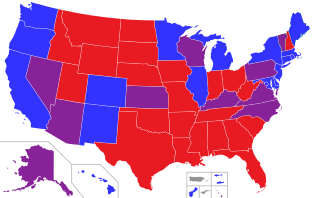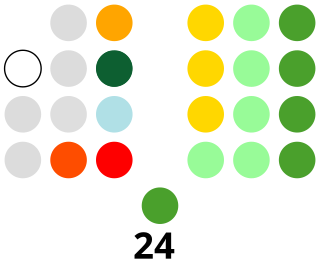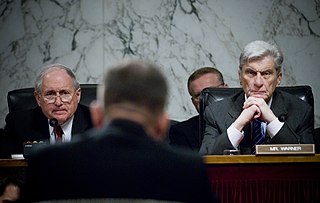
A state legislature in the United States is the legislative body of any of the 50 U.S. states. The formal name varies from state to state. In 27 states, the legislature is simply called the Legislature or the State Legislature, while in 19 states the legislature is called the General Assembly. In Massachusetts and New Hampshire, the legislature is called the General Court, while North Dakota and Oregon designate the legislature the Legislative Assembly.

The Congress of the Philippines is the legislature of the national government of the Philippines. It is bicameral, composed of a lower body, the House of Representatives, although colloquially the term "Congress" commonly refers to just the latter, and an upper body, the Senate. The House of Representatives meets in the Batasang Pambansa in Quezon City while the Senate meets in the GSIS Building in Pasay.

The Congressional Research Service (CRS) is a public policy research institute of the United States Congress. Operating within the Library of Congress, it works primarily and directly for members of Congress and their committees and staff on a confidential, nonpartisan basis. CRS is sometimes known as Congress' think tank due to its broad mandate of providing research and analysis on all matters relevant to national policymaking.
Contempt of Congress is the act of obstructing the work of the United States Congress or one of its committees. Historically, the bribery of a U.S. senator or U.S. representative was considered contempt of Congress. In modern times, contempt of Congress has generally applied to the refusal to comply with a subpoena issued by a congressional committee or subcommittee—usually seeking to compel either testimony or the production of requested documents.

Wayne Edward Whitfield is an American politician and attorney who served as the U.S. representative of Kentucky's 1st congressional district from January 1995, until his resignation in September 2016. He is a member of the Republican Party, and the first to represent the district. His district covered much of the western part of the state, including Hopkinsville, Paducah, Henderson and Kentucky's share of Fort Campbell.

The Alaska Legislature is the state legislature of the U.S. state of Alaska. It is a bicameral institution consisting of the 40-member Alaska House of Representatives and the 20-member Alaska Senate. There are 40 House Districts (1–40) and 20 Senate Districts (A–T). With a total of 60 lawmakers, the Alaska Legislature is the smallest bicameral state legislature in the United States and the second-smallest of all state legislatures. There are no term limits for either chamber. The Alaska Legislature meets in the Alaska State Capitol in Juneau, Alaska. The current sitting is the 32nd Alaska State Legislature.

The Maryland General Assembly is the state legislature of the U.S. state of Maryland that convenes within the State House in Annapolis. It is a bicameral body: the upper chamber, the Maryland Senate, has 47 representatives and the lower chamber, the Maryland House of Delegates, has 141 representatives. Members of both houses serve four-year terms. Each house elects its own officers, judges the qualifications and election of its own members, establishes rules for the conduct of its business, and may punish or expel its own members.

The Colorado General Assembly is the state legislature of the State of Colorado. It is a bicameral legislature that was created by the 1876 state constitution. Its statutes are codified in the Colorado Revised Statutes (C.R.S.). The session laws are published in the Session Laws of Colorado.

The Florida Legislature is the legislature of the U.S. State of Florida. It is organized as a bicameral body composed of an upper chamber, the Senate, and a lower chamber, the House of Representatives. Article III, Section 1 of the Florida Constitution, adopted in 1968, defines the role of the legislature and how it is to be constituted. The legislature is composed of 160 state legislators. The primary purpose of the legislature is to enact new laws and amend or repeal existing laws. It meets in the Florida State Capitol building in Tallahassee.

A congressional committee is a legislative sub-organization in the United States Congress that handles a specific duty. Committee membership enables members to develop specialized knowledge of the matters under their jurisdiction. As "little legislatures", the committees monitor ongoing governmental operations, identify issues suitable for legislative review, gather and evaluate information, and recommend courses of action to their parent body. Woodrow Wilson once wrote, "it is not far from the truth to say that Congress in session is Congress on public exhibition, whilst Congress in its committee rooms is Congress at work." It is not expected that a member of Congress be an expert on all matters and subject areas that come before Congress. Congressional committees provide valuable informational services to Congress by investigating and reporting about specialized subjects.

The Colorado Senate is the upper house of the Colorado General Assembly, the state legislature of the US state of Colorado. It is composed of 35 members elected from single-member districts, with each district having a population of about 123,000 as of the 2000 census. Senators are elected to four-year terms, and are limited to two consecutive terms in office. Senators who are term-limited become eligible to run again after a one-term respite.

The Clerk of the United States House of Representatives is an officer of the United States House of Representatives, whose primary duty is to act as the chief record-keeper for the House.
A United States congressional hearing is the principal formal method by which United States congressional committees collect and analyze information in the early stages of legislative policymaking. Whether confirmation hearings, legislative, oversight, investigative, or a combination of these, all hearings share common elements of preparation and conduct. Hearings usually include oral testimony from witnesses and questioning of the witnesses by members of Congress. George B. Galloway termed congressional hearings a goldmine of information for all the public problems of the United States. A leading authority on U.S. government publications has referred to the published hearings as "the most important publications originating within Congress." The Senate Library in a similar vein noted "Hearings are among the most important publications originating in Congress."

The Congressional Accountability Act of 1995 (CAA) applied workplace protection laws to approximately 30,000 employees of the legislative branch nationwide and established the Office of Compliance to administer and ensure the integrity of the Act through its programs of dispute resolution, education, and enforcement. The OOC educates members of Congress, employing offices and employees, and the visiting public on their rights and responsibilities under workplace and accessibility laws. The OOC also advises Congress on needed changes and amendments to the CAA; and the OOC's General Counsel has independent investigatory and enforcement authority for certain violations of the CAA.

The United States House of Representatives, often referred to as the House of Representatives, the U.S. House, or simply the House, is the lower chamber of the United States Congress, with the Senate being the upper chamber. Together they comprise the national bicameral legislature of the United States.

Benjamin Lee Cline is an American lawyer and politician who has served as the U.S. representative for Virginia's 6th congressional district since 2019. A member of the Republican Party, he represented the 24th district in the Virginia House of Delegates from 2002 to 2018.

The United States Senate is the upper chamber of the United States Congress, with the House of Representatives being the lower chamber. Together they compose the national bicameral legislature of the United States.

Procedures of the United States Congress are established ways of doing legislative business. Congress has two-year terms with one session each year. There are rules and procedures, often complex, which guide how it converts ideas for legislation into laws.

Matthew Martin Rosendale Sr. is an American politician and businessman from Montana. A member of the Republican Party, he is the U.S. representative for Montana's 2nd congressional district. He was first elected to the at-large district in 2020.

The Veteran Emergency Medical Technician Support Act of 2013 is a bill in the 113th United States Congress. The bill was introduced on January 14, 2013 by Rep. Adam Kinzinger (R-IL). It passed the United States House of Representatives on February 12, 2013 by a voice vote, indicating that it was generally non-controversial.

















